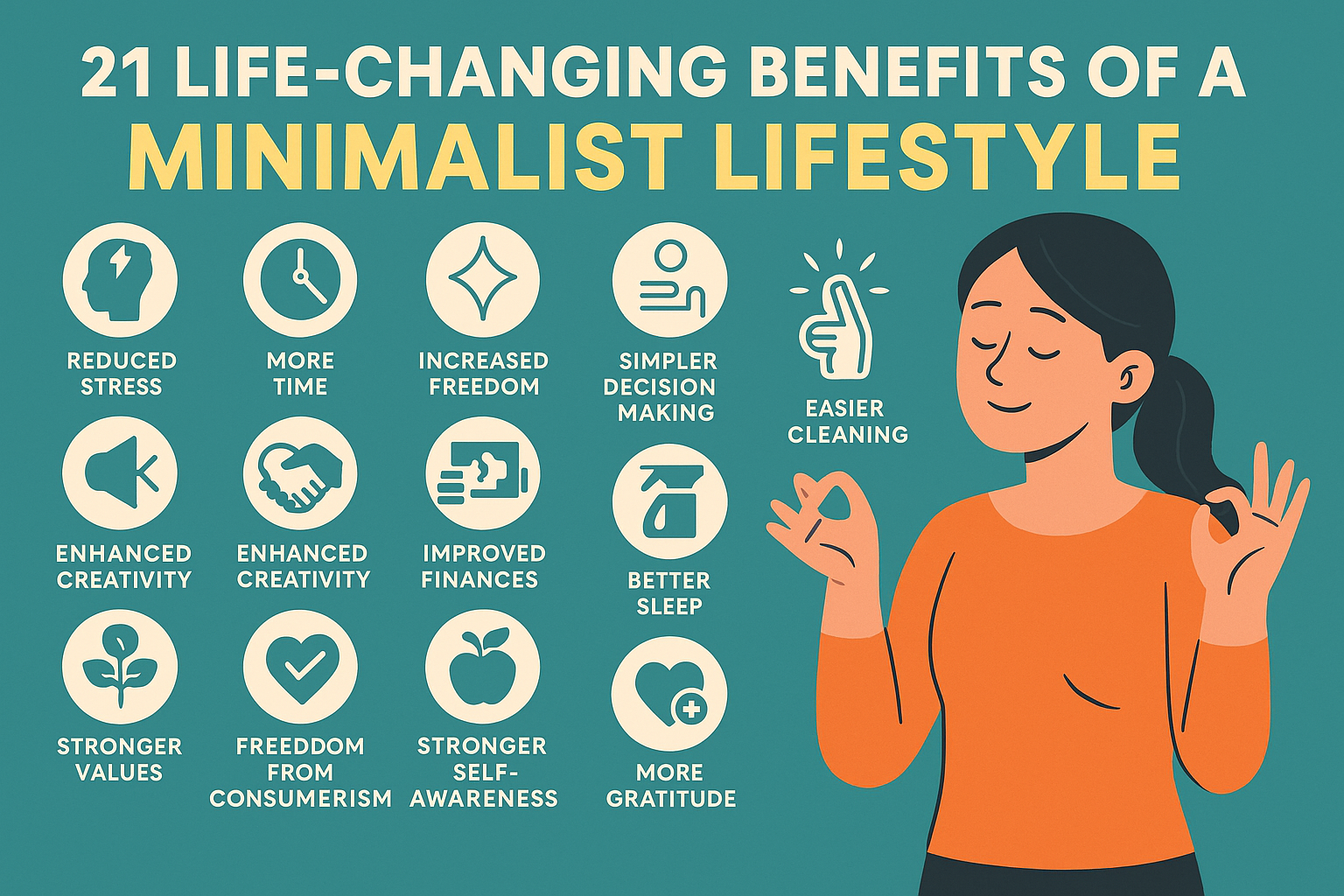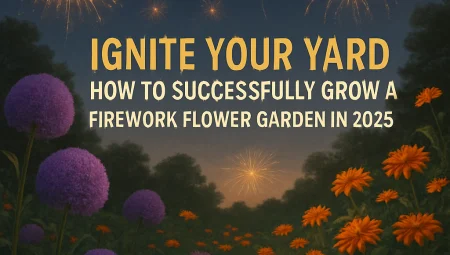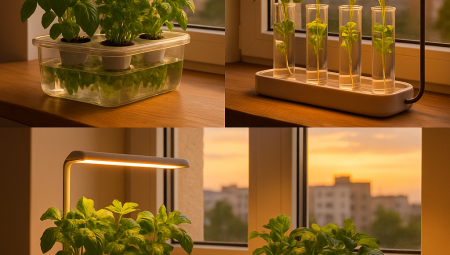What Is the Minimalism Lifestyle?
Minimalism isn’t just about having fewer possessions—it’s a mindful, intentional way of living. At its core, minimalism encourages:
-
Keeping what adds value
-
Letting go of clutter—both physical and emotional
-
Focusing on purpose rather than possessions
Many mistake it for deprivation, but true minimalism is about freedom and clarity, not scarcity.
Why Minimalism Is More Than Just Owning Less
Minimalism affects every area of your life:
-
Mentally: You think clearer and stress less.
-
Emotionally: You’re less attached to material things.
-
Socially: You make room for meaningful connections, not consumer comparisons.
21 Proven Benefits of Living Minimally
-
Reduced Stress – Clutter overloads the brain; fewer items bring mental relief.
-
More Time – You’re not wasting hours shopping, organizing, or cleaning.
-
Better Focus – Simpler spaces improve concentration and decision-making.
-
Clarity – You better understand your values and what truly matters.
-
Less Debt – Fewer purchases = more savings and financial security.
-
Increased Freedom – Minimalists aren’t tied down by stuff or lifestyle expectations.
-
Fewer Distractions – Without clutter, your mind can actually rest.
-
Improved Relationships – You focus more on people, not things.
-
Simpler Decision Making – Capsule wardrobes, minimal décor = less decision fatigue.
-
Enhanced Creativity – Simplicity often unlocks inspiration.
-
Improved Finances – You’re more intentional with spending.
-
Sustainability – Less consumption means a lighter footprint on the planet.
-
Better Sleep – Clean spaces and less anxiety promote restful nights.
-
Stronger Values – You realign your lifestyle with your principles.
-
Healthier Habits – You prioritize your mental and physical well-being.
-
Better Productivity – No clutter = more space to work and think.
-
Emotional Resilience – Minimalists handle change and challenge with more flexibility.
-
Easier Cleaning – Fewer objects mean less mess.
-
Freedom From Consumerism – You’re no longer chasing trends.
-
Stronger Self-Awareness – Simplicity sharpens your sense of self.
-
More Gratitude – You learn to appreciate what you have.
Minimalism vs Decluttering: What’s the Difference?
Although often used interchangeably, minimalism and decluttering are not the same.
Aspect Decluttering Minimalism Goal Remove excess Live intentionally with less Approach Often one-time cleanup Lifelong mindset shift Focus Physical possessions Overall lifestyle (time, energy, focus) Outcome Tidier space Simpler, more meaningful life Decluttering can be a first step toward minimalism, but true minimalists make deliberate choices about what they own, consume, and pursue.
How to Start a Minimalist Lifestyle
Beginning your minimalist journey doesn’t have to be overwhelming. Start small:
-
Declutter One Area at a Time
Begin with a drawer, closet, or desktop. Ask: Do I use or love this? -
Simplify Your Calendar
Say “no” more often to activities that drain you. -
Unsubscribe and Unplug
Limit digital clutter—emails, notifications, social media. -
Buy Less, Choose Well
Only buy things you truly need or deeply value. -
Practice Mindfulness
Stay present and resist the urge to accumulate for status or emotion.
Challenges People Face and How to Overcome Them
1. Letting Go of Sentimental Items
-
Tip: Keep a few symbolic items or take photos of the rest.
2. Fear of Regret
-
Tip: Use the 30-day box rule—store it, and if you don’t miss it, let it go.
3. Social Pressure
-
Tip: Remember that minimalism is about personal joy, not approval.
4. Consumer Temptation
-
Tip: Unfollow shopping influencers and unsubscribe from sales emails.
Minimalist Living in a Consumer World
Minimalism doesn’t mean living in a cabin or owning one spoon. It means being conscious in a world that thrives on unconscious consumption. Some ways to resist the noise:
-
Embrace quality over quantity.
-
Create boundaries for shopping and screen time.
-
Surround yourself with others who value simplicity.
Minimalism is not about rules—it’s about making room for what really matters.
FAQs About Minimalism
Q1: Do I have to throw everything away to be a minimalist?
No. Minimalism is about intentionality—not deprivation.Q2: Can families live minimally?
Absolutely. Many families thrive with fewer toys, clothes, and screen distractions.Q3: Is minimalism expensive?
It often saves money. You buy less and choose longer-lasting quality.Q4: What about hobbies that need gear (e.g., art, music)?
Minimalism isn’t anti-hobby. Keep what adds joy and purpose.Q5: Can I still enjoy fashion or decor?
Yes—just more intentionally and with a curated, mindful approach.
Conclusion: Why Minimalism Might Be the Key to True Fulfillment
In a noisy world full of distractions, living minimally can be a radical act of peace. By choosing less, you gain:
-
More mental clarity
-
More time for passions
-
More energy for relationships
-
And more freedom to live authentically
Minimalism isn’t about limits—it’s about liberation. Whether you take one small step or completely reorient your lifestyle, the benefits ripple through every area of life.
🔗 External Resource: The Minimalists – A popular resource on living a meaningful life with less.
-



